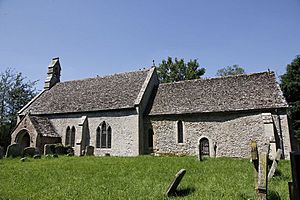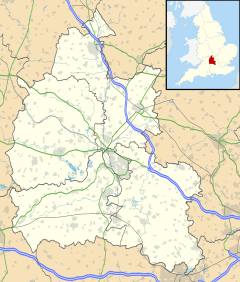Eaton Hastings facts for kids
Quick facts for kids Eaton Hastings |
|
|---|---|
 St Michael and All Angels parish church |
|
| Population | 81 (2001 Census) |
| OS grid reference | SU260982 |
| Civil parish |
|
| District | |
| Shire county | |
| Region | |
| Country | England |
| Sovereign state | United Kingdom |
| Post town | Faringdon |
| Postcode district | SN7 |
| Dialling code | 01367 |
| Police | Thames Valley |
| Fire | Oxfordshire |
| Ambulance | South Central |
| EU Parliament | South East England |
| UK Parliament |
|
Eaton Hastings is a small village in England. It sits right next to the famous River Thames. You can find it about 4 kilometers (2.5 miles) northwest of a town called Faringdon.
This village used to be part of Berkshire. But in 1974, it became part of Oxfordshire. This change happened because of new local government rules. Eaton Hastings was once much bigger. Today, it's almost like a "deserted medieval village." This means most of its old buildings are gone. In 2001, only 81 people lived there.
Contents
Discovering St Michael's Church
The most important old building still standing in Eaton Hastings is the Church of England parish church of St Michael and All Angels.
Church History and Design
The oldest parts of this church were built way back in the 11th century. It is made from rough stones called rubblestone. The church has a simple design. It includes a main hall (called a nave), a special area near the altar (called a chancel), and a small tower for bells (called a bellcote). The chancel was mostly built in the 13th century.
Between 1870 and 1873, the church was repaired and updated. This was part of a common trend in the Victorian era. St Michael's Church is considered a very important historical building. It is a Grade II* listed building. This means it has special historical or architectural importance.
Beautiful Stained Glass Windows
The church has some amazing stained glass windows. The window at the west end shows the archangels Michael, Raphael, and Gabriel. This window was put in during 1935 by a company called Morris & Co.. However, the designs for it were created much earlier, around 1860. They were designed by famous artists William Morris and Ford Madox Brown.
On the north side of the chancel, there is another beautiful stained-glass window. It shows St Matthew. This window was designed by Edward Burne-Jones. It was installed between 1872 and 1874.
Notable Burials
A famous person named Alexander Henderson, 1st Baron Faringdon, is buried in the churchyard. The angel statue on his tomb was made by the sculptor George Frampton. Next to the church, you can see the old rectory. This was the house where the church's priest used to live. It was built in the 19th century.
Eaton Hastings' Changing Story
The original village of Eaton Hastings grew up around the church. Today, only a few homes remain near the church.
Why the Village Shrank
The number of people living in Eaton Hastings started to drop after 1349. By the 1800s, it was mostly just a few scattered farmhouses. People think this decline happened for a few reasons. One idea is the terrible bubonic plague, which caused many deaths. Another reason might be "emparking," where land was turned into large private parks. Sheep farming also played a role, as it needed fewer people to work the land.
A New Part of the Village
In the late 1800s, a new group of houses was built. These homes were on the main road between Lechlade and Faringdon. A famous architect named Ernest George designed them. They were built for Alexander Henderson, 1st Baron Faringdon. This was part of a plan to improve the area for people.
Many people today think of these newer houses as the main part of Eaton Hastings. The remaining buildings of the original, older settlement are hidden away down a narrow lane.
 | Laphonza Butler |
 | Daisy Bates |
 | Elizabeth Piper Ensley |


